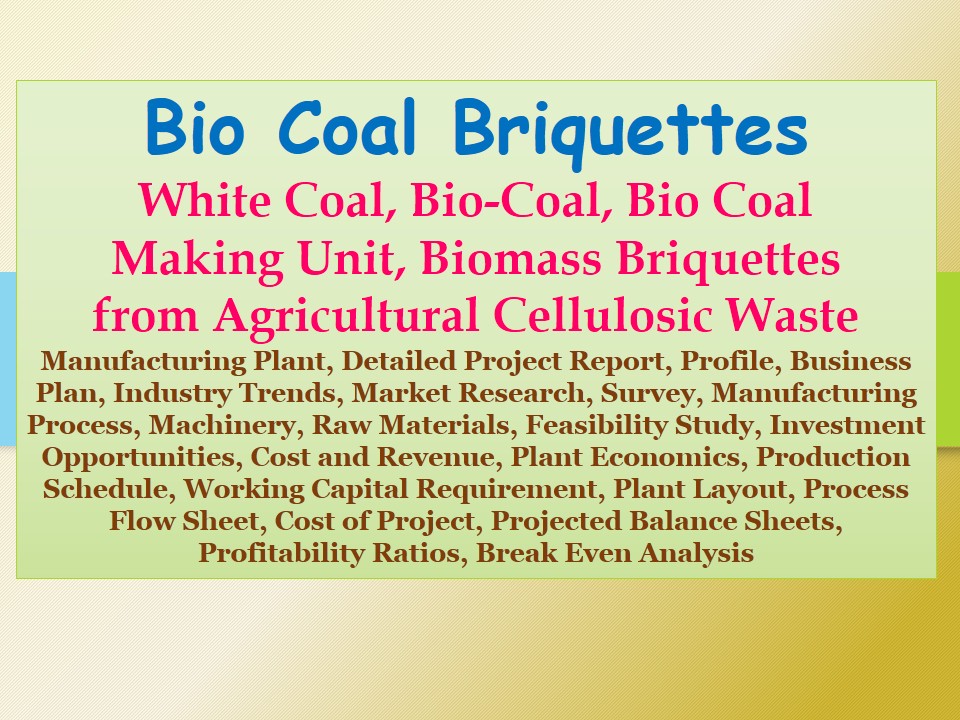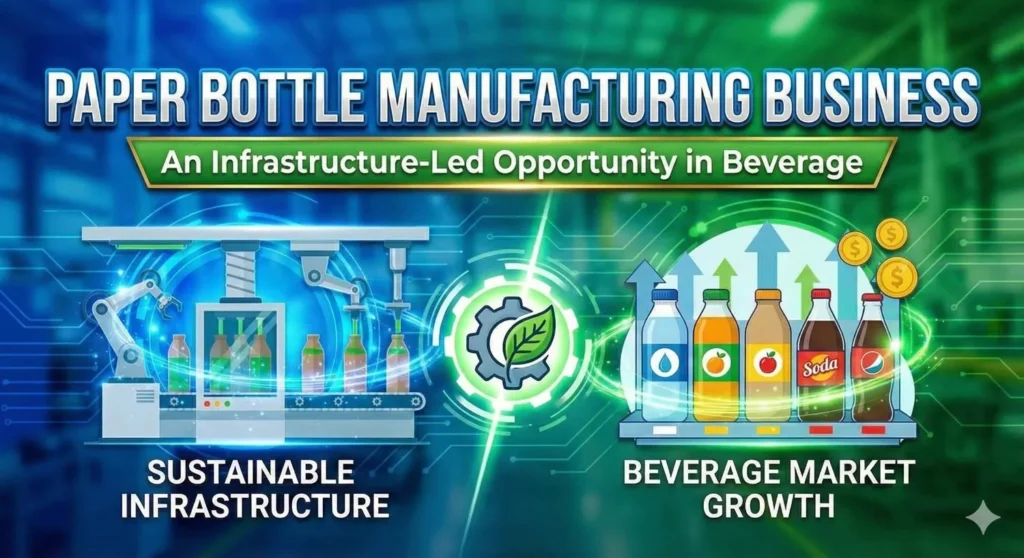
In a world where sustainability is no longer a choice but a necessity, cleaner fuel alternatives are gaining serious attention. Among these, Bio-Coal Briquettes & White Coal stand out as eco-friendly and cost-effective solutions. Made from agricultural and forestry waste, these fuels reduce carbon emissions, conserve resources, and provide energy efficiency across industries. Their usage is not just an environmental initiative—it’s also a strong business opportunity.
Contents
- 1 What Are Bio-Coal Briquettes & White Coal?
- 1.1 Why Choose Bio-Coal Briquettes & White Coal?
- 1.2 Raw Materials for Bio-Coal Production
- 1.3 Manufacturing Process of Bio-Coal Briquettes
- 1.4 Applications of Bio-Coal and White Coal
- 1.5 Setting Up a Bio-Coal Briquette Plant
- 1.6 Profitability & Market Demand
- 1.7 Government Support & Policies
- 1.8 Environmental Impact
- 1.9 Challenges to Consider
- 1.10 Final Thoughts
What Are Bio-Coal Briquettes & White Coal?
Bio-coal briquettes and white coal are clean, compressed forms of biomass fuel. Agricultural waste such as groundnut shells, sawdust, cotton husks, and sugarcane bagasse is collected. This waste is dried, crushed, and compacted under high pressure without using any chemical binders. The result is a solid, dense energy source that can replace coal, wood, and fuel oil in many applications.
See Also – Start Meat Processing Business
Bio-Coal Briquettes & White Coal are smokeless, non-polluting, and low in moisture. Their high thermal value and long shelf life make them ideal for industries that need reliable heat sources, like cement, textile, and food processing units.
Why Choose Bio-Coal Briquettes & White Coal?
These fuels offer a wide range of advantages:
-
Eco-friendly: They release minimal carbon dioxide and do not contribute to deforestation.
-
Cost-effective: Lower than coal and LPG in price, especially for industrial users.
-
Energy-efficient: Uniform size and consistent combustion help improve energy usage.
-
Easy storage and handling: They are lightweight and leave behind less ash.
-
Government-supported: Many states in India promote biomass-based fuels through incentives and subsidies.
Using Bio-Coal Briquettes & White Coal also reduces dependency on fossil fuels and encourages local employment in rural areas. This dual benefit of energy and employment makes them an ideal solution in India’s push for green energy.
Raw Materials for Bio-Coal Production
Various agricultural and industrial by-products can be turned into bio-coal. Some of the most commonly used raw materials include:
-
Cotton stalks
-
Rice husk
-
Peanut shells
-
Coffee husk
-
Sawdust
-
Sugarcane bagasse
-
Mustard husk
-
Wheat straw
-
Groundnut shells
These materials are abundantly available across India. The collection and transportation of these raw materials support local farmers and waste collectors, adding another layer of economic value.
Manufacturing Process of Bio-Coal Briquettes
The manufacturing of Bio-Coal Briquettes & White Coal involves a few essential steps:
-
Collection of biomass waste: Raw material is sourced from farms, sawmills, and agro-industrial units.
-
Drying: The moisture content must be reduced to below 10% for effective briquetting.
-
Grinding: Large particles are crushed into fine powder to ensure uniformity.
-
Briquetting: The powder is fed into a briquetting machine that applies high pressure to form briquettes.
-
Cooling and packaging: Finished briquettes are cooled and packed for transportation or storage.
No chemical additives are used in the process, making it a green and safe alternative to traditional fuels.
Applications of Bio-Coal and White Coal
Industries across sectors are using Bio-Coal Briquettes & White Coal as replacements for coal and other fossil fuels. Here are some common applications:
-
Textile and dyeing units
-
Ceramic and brick kilns
-
Milk and dairy plants
-
Food processing industries
-
Lime kilns
-
Chemical and pharmaceutical plants
-
Thermal power generation
Domestic cooking, heating in cold regions, and even rural electrification can also benefit from this renewable energy source. In addition, bio-coal can serve as a backup fuel during power outages or LPG shortages.
Setting Up a Bio-Coal Briquette Plant
Starting a plant for Bio-Coal Briquettes & White Coal requires planning, capital, and access to raw materials. Here is a basic roadmap:
-
Business registration: Obtain licenses such as Udyam registration, GST, factory license, and pollution clearance.
-
Land and utilities: Minimum 5000–7000 square feet is need with access to power and water.
-
Machinery: A typical setup includes a crusher, dryer, briquetting press, and packing machine.
-
Manpower: Semi-skilled labor is sufficient for operations.
-
Investment: Around ?20–30 lakh for a small-scale plant.
-
Sourcing: Build tie-ups with local farmers and sawmills for steady raw material supply.
Location is key. Proximity to biomass waste and demand centers will reduce logistics cost and improve profitability.
Profitability & Market Demand
Due to rising fuel costs and government bans on polluting fuels, the market for Bio-Coal Briquettes & White Coal is growing quickly. Industries are looking for stable and legal fuel sources, especially with environmental norms becoming stricter.
On average, a small plant can produce 1000–1500 kg of briquettes per day. At ?6–8 per kg sale price and ?3–5 input cost, the margins are attractive. Return on investment can be expect within 18–24 months in most cases.
Moreover, export potential to countries with cold climates or energy shortages is increasing. European and Asian nations are exploring biomass fuels to meet sustainability targets.
Government Support & Policies
The Indian government supports biomass energy through schemes like:
-
MNRE’s biomass programme
-
Subsidies for non-conventional energy
-
Priority sector lending under MSME
State industrial policies in Gujarat, Maharashtra, Rajasthan, and Madhya Pradesh offer financial assistance and tax benefits for setting up bio-energy plants. Entrepreneurs can also benefit from carbon credit trading under international frameworks.
Environmental Impact
Using Bio-Coal Briquettes & White Coal helps reduce:
-
Carbon dioxide and methane emissions
-
Deforestation caused by wood burning
-
Air pollution from coal and furnace oil
-
Agricultural waste burning, which harms soil health
Moreover, these fuels contribute to a circular economy. Waste gets transform into a productive input, reducing landfill use and air pollution from open burning.
Challenges to Consider
While the benefits are clear, some challenges need to be address:
-
Seasonal supply of raw material
-
Moisture issues during monsoon
-
Machine maintenance and downtime
-
Need for consistent market linkage
-
Initial awareness among buyers
With proper planning, quality control, and marketing, these challenges can be effectively overcome.
See Also – Dyestuff Business
Final Thoughts
The future of sustainable energy in India lies in tapping into agricultural waste and converting it into reliable fuel. Bio-Coal Briquettes & White Coal represent this future. Whether you’re a farmer, entrepreneur, or industrial buyer, this clean energy solution offers significant economic and environmental benefits.
As industries shift to green alternatives, those who invest early in this sector can expect long-term gains. From pollution reduction to job creation, this business is both impactful and profitable.
Start exploring the potential of Bio-Coal Briquettes & White Coal today—and power your future with waste-to-energy innovation.




